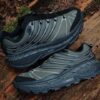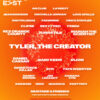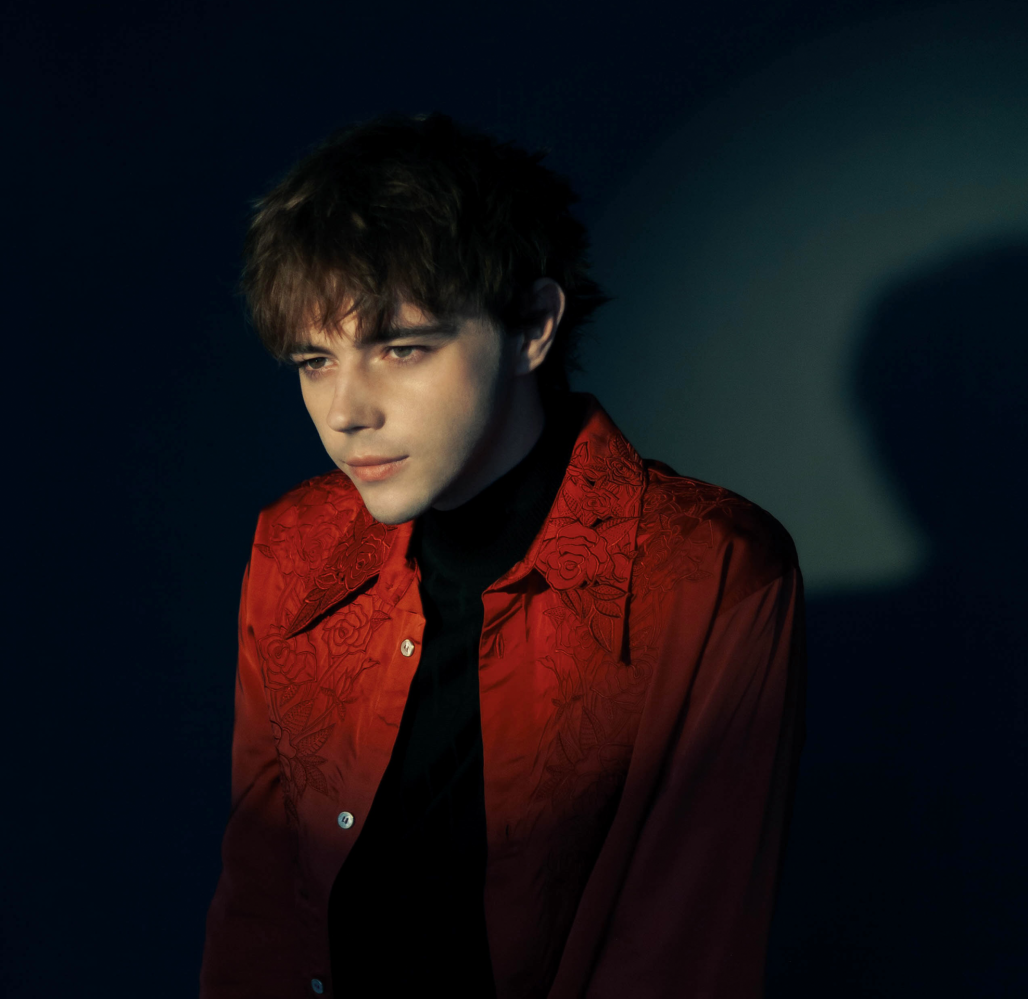
Rewrite
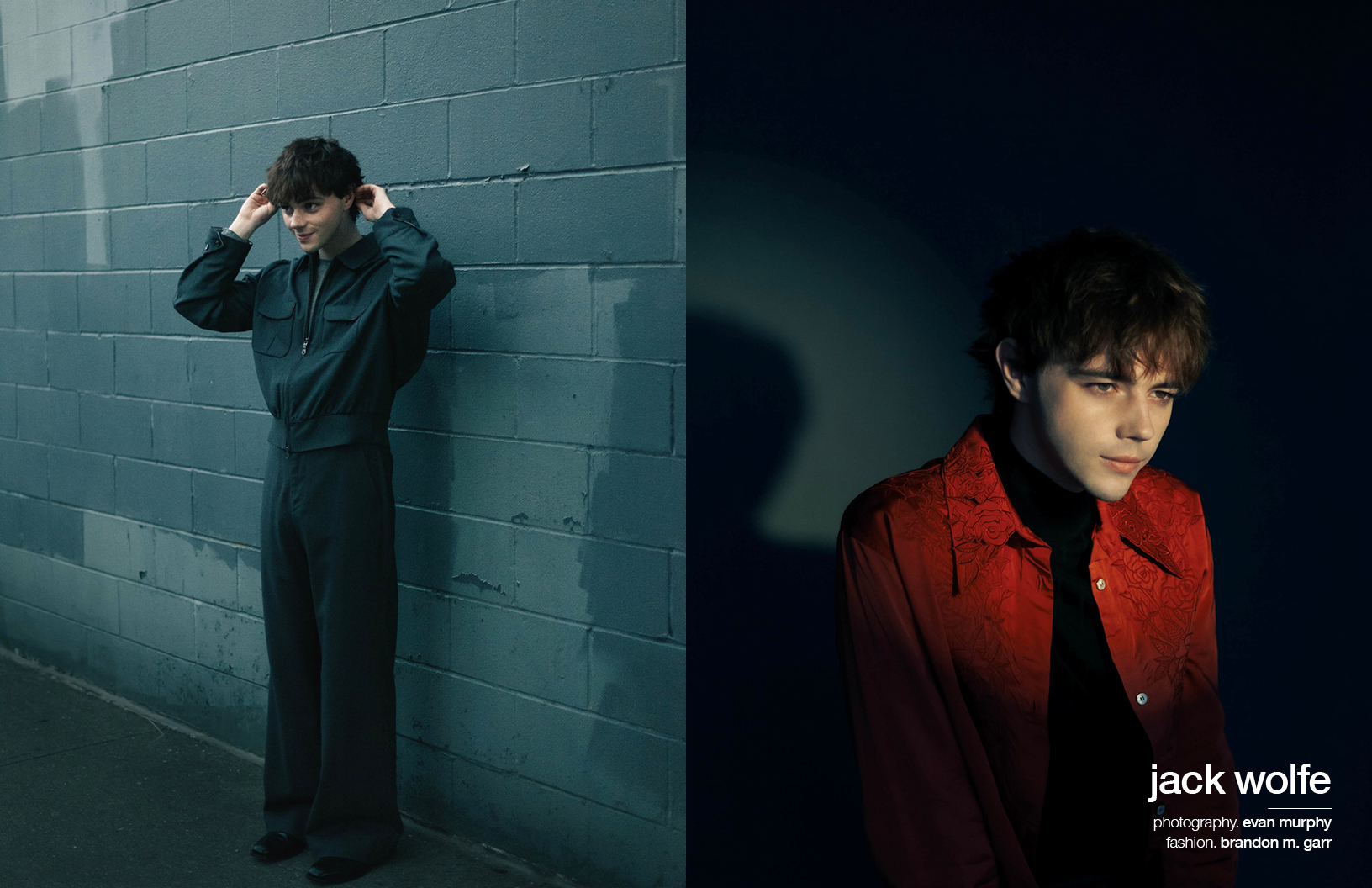
jacket, shirt + trousers. R.SWIADER
shoes. Manolo Blahnik
rings. Edgar Mosa
opposite
shirt + turtle neck. AMIRI
There’s a soft-spoken thoughtfulness about Jack Wolfe — the kind that feels both deeply grounded and a little bit cosmic. When we speak, he’s just begun his run as Orpheus in the New York production of ‘Hadestown’, making his Broadway debut on one of the world’s most storied stages. But even as he talks about that milestone, his focus keeps drifting backwards — to the boy from Yorkshire who once found it hard to speak at all, and to the teenager who fell in love with theatre.
“I was an incredibly anxious kid — basically mute,” Wolfe admits. “It took a lot of help for me to start speaking, to make friends. The idea of performing on Broadway was something I could only fantasize about. It was never going to happen.” He pauses, then smiles. “Now it’s wild to think: I’ll always have had a Broadway debut. Younger Jack would absolutely lose his mind.”
It is the second time we’ve spoken in three years, and Wolfe has truly gone from strength to strength since our first meeting. He found a feverish fanbase after his role as Wylan Hendriks on ‘Shadow and Bone,’ and his performance as Gabe in the Donmar Warehouse’s ‘Next to Normal‘ left audiences (and critics) stunned — a turn he describes as “validating and empowering.” The production taught him to trust his instincts and embrace what makes him different. “I’ve always sort of existed outside of a binary,” he says.
It’s his Broadway debut, though, that shows how the past few years have been transformative for him. The same instinct for authenticity carries into his ‘Hadestown’ Orpheus, a version shaped by quiet intensity rather than heroic bravado. “I couldn’t imagine my Orpheus as this Grecian hero,” he says. “He’s not confident in sharing his poetry or his music — it costs him something every time he performs. But his love for Eurydice is cosmic, and that’s what drives him through it.”
For Wolfe, each project seems to circle back to that childlike sense of wonder — the very thing that first drew him to acting. And because of that, much of what he does is for the younger version of him. In conversation with Schön!, Jack Wolfe is equal parts open-hearted and self-deprecating, talking about his acting journey so far, making his Broadway debut as Orpheus in the beloved ‘Hadestown,’ and more.
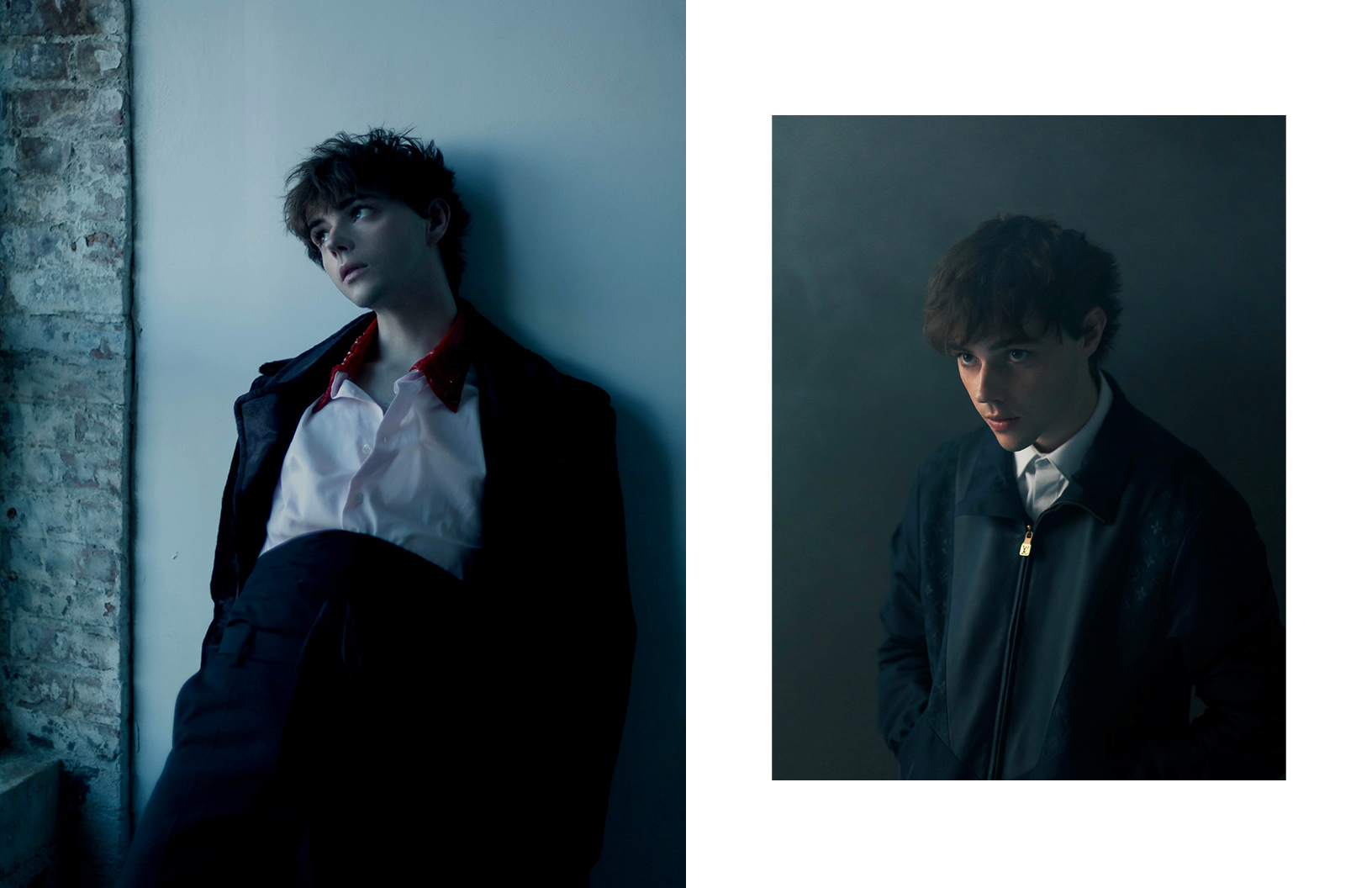
coat, shirt + shorts. Dries Van Noten
opposite
full look. Louis Vuitton
It’s been cool to see you go from strength to strength — I think our first feature together was for The Magic Flute back in 2022. Three years later, how would you describe your growth as an actor since then?
Thank you. I’m so grateful because it was one of the first features I’d ever done. I’d never really had anyone interested in what I had to say, so it was a really cool thing. The past three years have been a bit of a blur. It’s been wild. I feel very lucky. It’s been special.
I’ve been trying to get more in touch with what I want to do and what I want to say. That’s been a journey happening more now, three years later, where I’m beginning to think about the stories I want to tell, the ways I want to tell them, and how I might be able to do that, as opposed to just waiting and hoping something comes my way.
I’ve been really lucky to work with incredible people who’ve taught me a lot and left me with practical knowledge, advice, and experiences in different parts of the industry — theatre, TV, and film. Meeting people and becoming more aware of what it really means to be better, and what “better” means. It’s been really cool. And I’ve managed to hold on to everyone! [Laughs]
I was going to say — I know you still do the conventions with the Shadow and Bone cast, and it seems like you guys have fun all the time. I know you’re close with your Next to Normal cast as well. It feels like you build little families for each project, which I think is a testament to the actor you are, the projects you pick, and you as a person, that you build these little communities and families.
Very community-driven, always. I’m always happy in that way. For me, 70 to 80% of the job involves getting to know people and working alongside them. As an actor, I realize how important that is for me and my process in performing. Especially in theatre, there’s such an immediacy to the moment that having inbuilt chemistry with people is really helpful. It makes it easier and makes the time together better. Why wouldn’t you want to make friends with everyone?
The projects I’ve done after Shadow and Bone have felt very in touch with my younger, teenage self, and it feels like I’ve been collecting dreams for him, which has been really cool. The people involved in those productions are either idols of mine I get to meet and thank for inspiring me, or people who are also drawn to similar projects. So we have a lot in common to begin with.
Shadow and Bone was incredible — a group of 15 or 16 young actors thrown together to shoot in Budapest over six months. We couldn’t travel much because we shot in 2021, so there were still restrictions, and they had to keep us safe, which meant we had lots of free time and only each other for company. It made for a really close family, which still exists. Anytime I do a convention, it feels like a reunion for us — a chance to reunite and spend the weekend together. It’s great.
So lovely. You mentioned something about returning to the teenage version of you. I always think, even for me — I’m not an actor by any means — but for anyone in a creative profession, you’re trying to get back to that childlike joy and wonder. So I want to ask about selecting projects. Is that something you have in mind when picking specific things to work on or characters you’re interested in?
There is an illusion of choice for a lot of actors. Especially starting out, I have to earn money and pay my rent. I think I’m lucky if anything comes my way, honestly. I’m lucky if people want to work with me, and that’s really cool. You’re right, though — I have been drawn toward things recently that feel connected to my younger self. It’s the things I know younger Jack would be proud of. Over the years, I’ve changed and grown, but there are still those things I want to do. A lot of it has been, “How could I turn away from the chance to meet the people who made the work that inspired me to be an actor, or to dive into material that moved me growing up?”
I’ve managed to do that with a couple of theatre projects. Next to Normal was a huge one — I was a massive fan of that show as a teenager, so getting to be in the room for it was amazing. I also did a one-night Spring Awakening concert, which was a dream. Hadestown has been special because it speaks to that version of me, but a little older. It was the most recent show that had that effect on me. When I saw it in 2019, I felt like a teenager again. It really excited me because I hadn’t seen anything like it before. When they asked me to be part of it, it was such a no-brainer. I felt like the luckiest boy in the world. Whenever I doubt myself, I remind myself that younger Jack would lose his mind. That keeps me going.
I do want to talk about Hadestown, but I also need to talk about Next to Normal briefly because I saw it last summer and was completely blown away. I went in completely blind, and I was in awe of the cast. Despite it being a heavy show, everyone’s performance was incredible. It’s such a small cast, so I can understand why you all got so close.
Yeah, it was really special. Mike Longhurst [director] gave us space to find everything for ourselves in it. It was raw and really cool to explore.
How has the process of fleshing out a character influenced how you now approach characters going forward? I feel like every role meets you where you’re at in that moment.
It does. What I learned from Next to Normal was the value of trusting my instincts. I’ve always existed outside of a binary, outside the norm. I’ve always felt a bit different. When I was called in to audition for Gabe in Next to Normal, I thought, “This is a fantasy come true, but it’s not going to happen.” I didn’t think anyone would cast me in that role. I know how I present. But Mike Longhurst wanted to explore a different version of the character, and that was really special. There were a lot of moments of, “What do you think, Jack? What’s your point of view?” It was validating and empowering.
Coming into Hadestown, I have perspectives I want to explore, and it’s fun to trust that. To take a strong, front-footed approach to the character and say, “This is how I see it,” without being apologetic or quiet about it. I’m always up to play and collaborate, but it’s cool to have a point of view and feel open to sharing it now.
I spoke with Dónal Finn for an interview a few years ago and we discussed how, in every rendition of Orpheus, they’ve allowed the actors to use their own accents and quirks, which I think is affirming for whoever’s playing him. What do you think you’re bringing to Orpheus that’s different from the ones you’ve seen or heard before?
Firstly, I had the privilege of watching Dónal, Dylan [Wood], Jordan [Fisher], and all the Orpheuses I’ve seen before. So, of course, there are parts of their performances that inspired me. What’s cool is that all the Orpheuses are so different — no two actors play him the same way. A lot of the work is already done just by being who I am. I take the shape on stage differently, and I’m allowing myself to lean into that rather than fight it.
I couldn’t imagine my Orpheus as a Grecian hero. It’s much more interesting to explore his tragic nature and to give him something to fight against throughout the show — to keep that drive going. I think he’s possibly the least likely person to walk in and out of hell. He’s not someone extremely confident in sharing his poetry or his music, but someone who’s been touched and given this responsibility without necessarily wanting it. It’s cosmic, like he’s called to something far bigger than he is or thinks he is.
There’s a real cost for him in everything he does. Things take a lot out of him. But ultimately, his love for Eurydice is cosmic, and that’s what carries him through, terrified or not. I think that encapsulates it a bit.
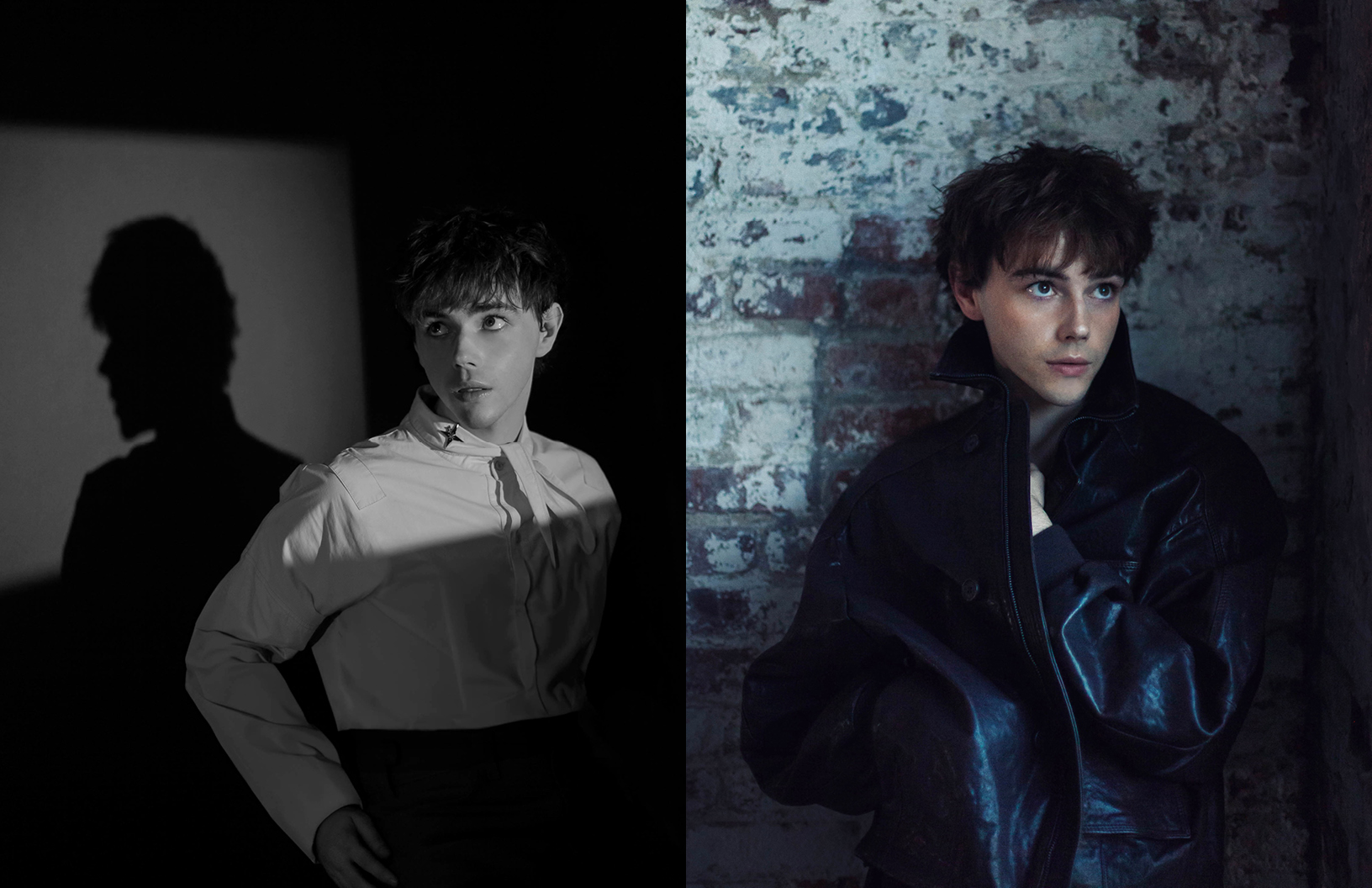
full look. LUMÈRE
opposite
jacket. Emporio Armani
I haven’t had the pleasure of seeing you as Orpheus yet, but everyone loves you in the role. Someone commented on your physicality in the show — how you start more closed off and then gradually open up as Orpheus gains confidence. Was that a conscious choice, or something that developed naturally?
It’s conscious. I think a lot about how a character inhabits space — without sounding pretentious — how he moves and responds.
Right, like asking someone how they breathe — it’s just second nature.
Exactly. The things that happen to him before or after each moment affect how he stands or walks. There are a few layers to how I approach the role — things that might never be noticed by the audience but are there for me, to carry me through the show. Those choices affect how I move, sing, speak, and breathe.
It’s also part of the fun — I love doing that kind of work. I’m not tied to any of it, though. That’s the mould I start with each night, but the goal is to stay open to whatever Morgan [Dudley], Kurt [Elling], or Rebecca [Naomi Jones] give me. If Rebecca gives me something new in a scene, I want to meet that. Everything stays malleable. But yes, there is a particular physicality to my Orpheus.
I saw a clip of you earlier today — I think it was on the Hadestown Instagram account — where you were talking about playing guitar and approaching it much like Orpheus would, as a learner. I wanted to ask about that because I do feel like a character meets you where you are, and if you’re very open to learning guitar, this feels like a great fit.
Yeah. There was nothing that was going to hold me back from playing this. I’d played guitar very casually for a couple of years — I knew the same three or four chords, and that was all I’d ever needed. But for this role, it calls for a guitarist, and all the actors I’d seen play Orpheus were really skilled guitarists, which is great, but that wasn’t a strength I already had. So I had to learn for the role.
I didn’t have long to prepare for rehearsals, and I worked really hard. But I had to ask myself — Orpheus has to be a poet and songwriter, but does he have to be an incredible guitarist? In the text, it doesn’t say he’s a brilliant performer. It says he’s a poet and a songwriter, not necessarily someone who likes sharing his work. That gave me an interesting route to explore — what if performing costs Orpheus something? What if, when he sings “Epic I” in front of his friends, it’s not in his nature to do that, and it makes him nervous to share that side of himself?
So when he performs in front of Hades later, with so much at stake, it costs him even more. It makes that moment more torturous and emotional, which I really wanted to explore. Now it’s getting easier, which is great, but there was something really raw about those first few performances that I’ve probably lost just by doing the show more.
I love that. I love that you actually read the text and thought, “It doesn’t say he’s amazing at this — I don’t have to be.” That’s such a humbling approach.
That’s the fun thing about any show. You take what the text and your research say, figure out what the character needs to be for the story to make sense, and protect the integrity of the story. Outside of that, there’s creative freedom. I’m incredibly lucky that Rachel Chavkin, our director, Keenan, our resident director, and Emilio are all open to letting us find our own version.
They don’t say, “Orpheus has to be like this.” There are certain iconic moves or poses he goes through, but the real essence of the character is up to you. They let me experiment, and hopefully it works. I’m enjoying it, and I hope people respond to it. It’s been fun finding my way through it.
Orpheus and Gabe are both roles tied to love, loss, and grief. Have you noticed any connections between them? Has playing one informed the other?
They definitely connect. The tragedy of both characters is what I find exciting — those complex, layered relationships to unpick on stage are what I love. The tension between Gabe and Dan in Next to Normal was thrilling to explore with Caissie [Levy] as Diana and Jamie [Parker] as Dan — that family dynamic was such a fascinating tangle.
In Hadestown, there’s also so much tragedy woven into the story. Even the fact that the story repeats — that we tell it again and again — is beautiful and haunting. Sometimes I wonder if Orpheus feels tired of it, if he somehow remembers that he’s never truly succeeded. What if, deep down, a part of him knows it won’t end differently? It’s a massive thought, maybe too subtle for an audience to pick up on, but I love playing with that tension.
Gabe influenced a lot for me. I’d never had that much space to paint with broad strokes before — so much freedom and trust from the director and the team to make bold choices, to be vulnerable. I take that with me now into everything. Vocally, Next to Normal was also a huge challenge; I’d never had to sing like that before, and I’m grateful for the support from my singing teacher and the music team. It put me in a stronger place for Hadestown.
I just love Hadestown — the material, the music, the way it was built. You can still feel, six years later, that it’s a show made with so much creativity and love. It’s authentic and sensitive, and that makes it really special to perform.
Why do you think Hadestown resonates so much with people? Even when I’ve brought friends to see the West End production, they’ve said, “I don’t even know the show, but there’s something about it.” I don’t know if it’s the circular storytelling or something else, but what is it for you?
I think it’s a lot of things. Firstly, there’s the shared knowledge of the myths — these stories have been told for centuries for a reason. They’re compelling, they show characters you might recognize in your real life, but on these big, tragic stages. Anaïs’ book and music are also just beautiful. If you’re drawn to that folk tradition, or even to jazz or New Orleans-style influences, it pulls you in immediately. Theatrically, too, it’s very authentic and unlike anything else — stark, creative, and very ensemble-led.
I love seeing productions where you can see the company working hard, and Hadestown really asks a lot of its cast. I think audiences respond to that. And it goes without saying — Hadestown, even if it wasn’t written with this as its direct intention, is so inherently political and unafraid of that. That’s refreshing. Orpheus’s mantra, for example, is about seeing the world as it could be in spite of how it is. That’s a beautiful kind of naivety, and it’s also radical hope.
The show doesn’t shy away from what’s hard to face in the world, but it presents it in a way that’s poetic and cathartic — and I think that’s why it resonates so deeply.
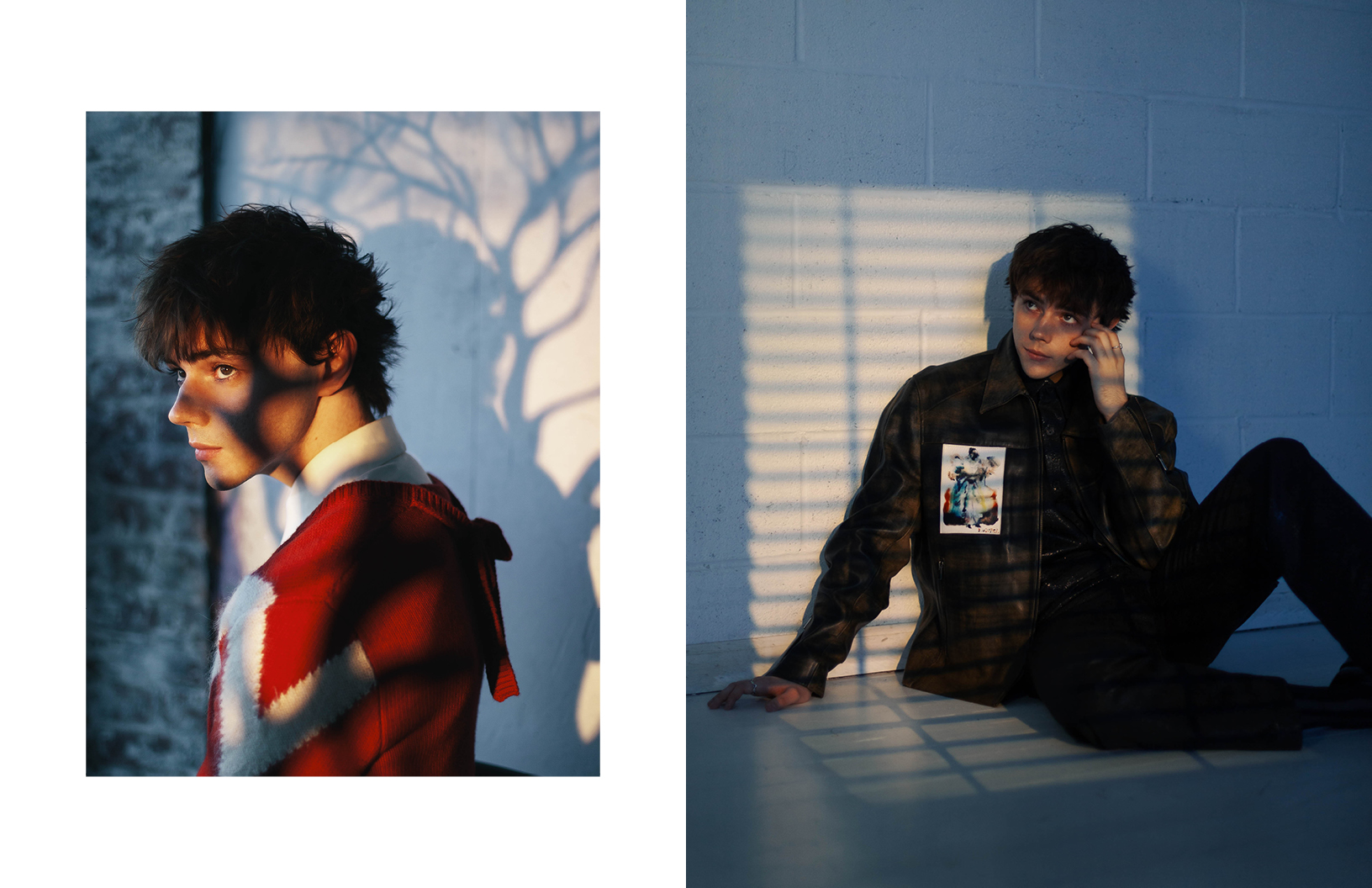
full look. Valentino
opposite
jacket. KIDSUPER
shirt + trousers. R.SWIADER
shoes. Manolo Blahnik
rings. EDGAR MOSA
I want to talk a bit about your collaboration with Passenger, which is so beautiful. You were also in The Unlikely Pilgrimage of Harold Fry, which I believe the album was inspired by.
Yeah, it’s sort of a concept album he wrote. It’s music that came out of his work on the play — songs that didn’t make it in, or maybe did — but it’s him sharing that experience.
It’s such a beautiful song. And your voice — everyone in the comments was saying you sound like an angel, and they’re right. You just have such a clear tone. What was it like filming the video and recording the track?
It was amazing. Such a cool day. And actually, it felt a bit full-circle — or cyclical again — because when I was 21, I was the reference for the puppet in Passenger’s The Boy Who Cried Wolf music video. It’s a stop-motion animation, and the puppet is literally based on me! I went to the artist’s studio, acted out the video, and they drew from that. I’d had this funny little connection to Passenger for years, even though we’d never met. When he asked me to feature on his album, it was surreal — and he also knew that I’ve been quietly writing my own music for a long time. I’m nervous to share it, but maybe one day I will.
It kind of felt like his way of helping me experience what releasing music might be like. We recorded the song in the morning and shot the video in the afternoon — all in one day. It was a bit of magic, honestly.
That’s so serendipitous! I love how meant-to-be that feels — like, you were literally modelled for that video.
Yeah, it’s great. And it also speaks to me being quite sentimental — I like finding meaning in coincidences. People might think that sort of thing happens all the time, but I’m like, No, no, that means something.
I saw that lovely photo you posted on Instagram about making your Broadway debut. You wrote about “little me from Yorkshire,” and it really got me. What would you say to that version of yourself?
It’s really nice to have the space to connect with that. As a very young child, I was incredibly anxious and basically mute — it took a lot of help for me to start speaking, making friends, and feeling comfortable. I went to a youth theatre that completely changed my life, and I’ve talked to you about it before.
The wild thing is, if I tried to talk to that younger version of me, he probably wouldn’t even be able to talk back — which is kind of poetic, isn’t it? As creatives, we’re so conditioned to always look forward, never back. When I was a kid, performing on Broadway wasn’t just unrealistic — it was impossible. Even last year, it still felt like a fantasy. And then, somehow, through a series of miracles and people believing in me, I ended up there.
But the funny thing is, in the moment, it doesn’t feel like what you think it will. You’re just terrified — “What if I mess this up? What if this is the night someone records a bootleg and it’s my first show?” It’s chaos inside your head. You have to stop and consciously look back to realize how huge it is — that you’ll always have had your Broadway debut. That little boy in that old photo got to do it.
When I think about everyone who helped me — my youth theatre director, my English teacher, the people who took chances on me — it’s emotional. You don’t often get the space to look back like that, so thank you for letting me do it.
Of course. I think we get so used to chasing the next thing that we forget to look back and realize how far we’ve come.
Exactly. I think little Jack would completely lose his mind.
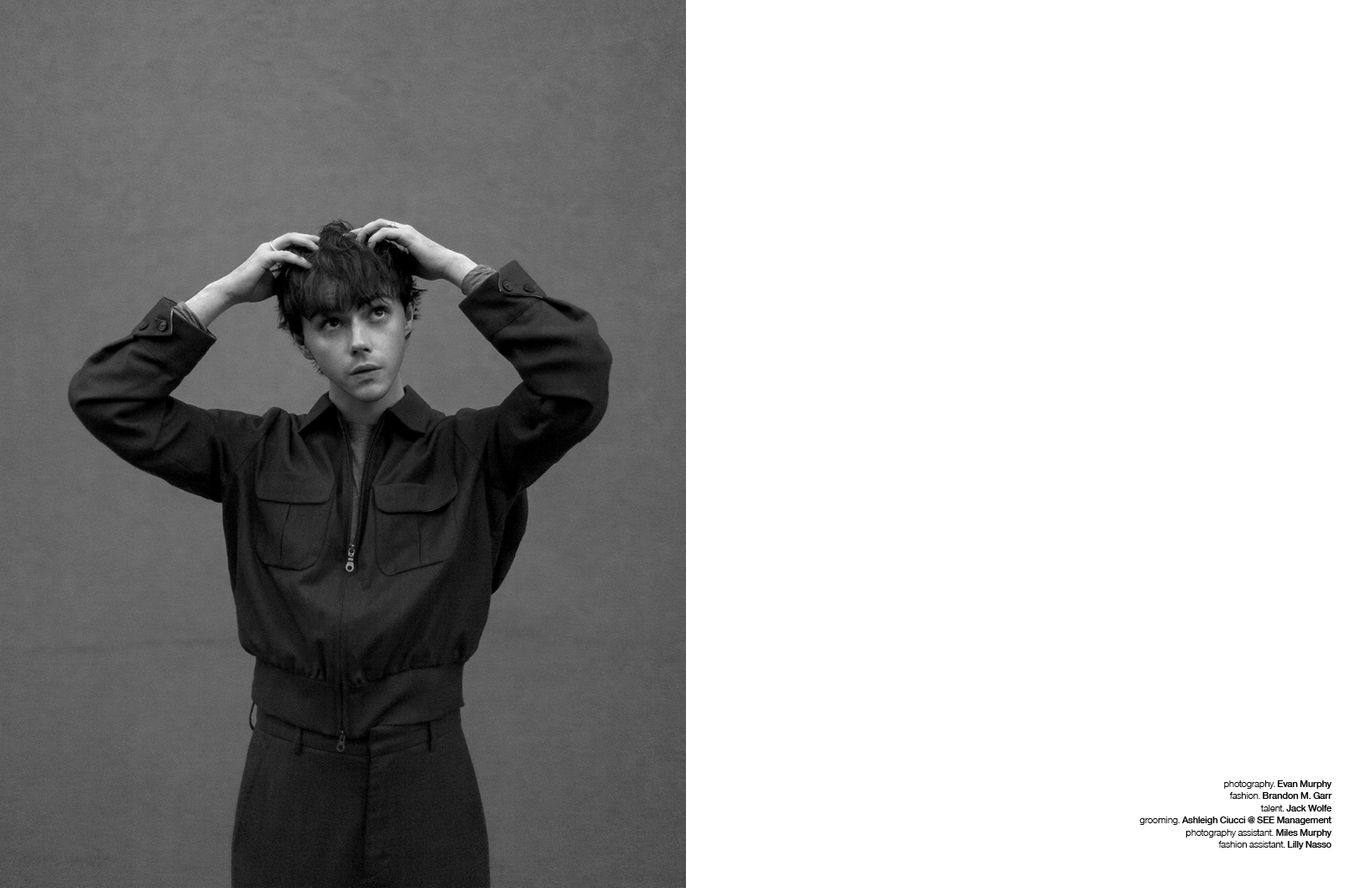
jacket, shirt + trousers. R.SWIADER
rings. Edgar Mosa
Jack Wolfe can be seen in ‘Hadestown’ on Broadway now.
photography. Evan Murphy
fashion. Brandon M. Garr
talent. Jack Wolfe
grooming. Ashleigh Ciucci @ SEE Management
photography assistant. Miles Murphy
fashion assistant. Lilly Nasso
interview. Kelsey Barnes
in HTML format, including tags, to make it appealing and easy to read for Japanese-speaking readers aged 20 to 40 interested in fashion. Organize the content with appropriate headings and subheadings (h1, h2, h3, h4, h5, h6), translating all text, including headings, into Japanese. Retain any existing
tags from

jacket, shirt + trousers. R.SWIADER
shoes. Manolo Blahnik
rings. Edgar Mosa
opposite
shirt + turtle neck. AMIRI
There’s a soft-spoken thoughtfulness about Jack Wolfe — the kind that feels both deeply grounded and a little bit cosmic. When we speak, he’s just begun his run as Orpheus in the New York production of ‘Hadestown’, making his Broadway debut on one of the world’s most storied stages. But even as he talks about that milestone, his focus keeps drifting backwards — to the boy from Yorkshire who once found it hard to speak at all, and to the teenager who fell in love with theatre.
“I was an incredibly anxious kid — basically mute,” Wolfe admits. “It took a lot of help for me to start speaking, to make friends. The idea of performing on Broadway was something I could only fantasize about. It was never going to happen.” He pauses, then smiles. “Now it’s wild to think: I’ll always have had a Broadway debut. Younger Jack would absolutely lose his mind.”
It is the second time we’ve spoken in three years, and Wolfe has truly gone from strength to strength since our first meeting. He found a feverish fanbase after his role as Wylan Hendriks on ‘Shadow and Bone,’ and his performance as Gabe in the Donmar Warehouse’s ‘Next to Normal‘ left audiences (and critics) stunned — a turn he describes as “validating and empowering.” The production taught him to trust his instincts and embrace what makes him different. “I’ve always sort of existed outside of a binary,” he says.
It’s his Broadway debut, though, that shows how the past few years have been transformative for him. The same instinct for authenticity carries into his ‘Hadestown’ Orpheus, a version shaped by quiet intensity rather than heroic bravado. “I couldn’t imagine my Orpheus as this Grecian hero,” he says. “He’s not confident in sharing his poetry or his music — it costs him something every time he performs. But his love for Eurydice is cosmic, and that’s what drives him through it.”
For Wolfe, each project seems to circle back to that childlike sense of wonder — the very thing that first drew him to acting. And because of that, much of what he does is for the younger version of him. In conversation with Schön!, Jack Wolfe is equal parts open-hearted and self-deprecating, talking about his acting journey so far, making his Broadway debut as Orpheus in the beloved ‘Hadestown,’ and more.

coat, shirt + shorts. Dries Van Noten
opposite
full look. Louis Vuitton
It’s been cool to see you go from strength to strength — I think our first feature together was for The Magic Flute back in 2022. Three years later, how would you describe your growth as an actor since then?
Thank you. I’m so grateful because it was one of the first features I’d ever done. I’d never really had anyone interested in what I had to say, so it was a really cool thing. The past three years have been a bit of a blur. It’s been wild. I feel very lucky. It’s been special.
I’ve been trying to get more in touch with what I want to do and what I want to say. That’s been a journey happening more now, three years later, where I’m beginning to think about the stories I want to tell, the ways I want to tell them, and how I might be able to do that, as opposed to just waiting and hoping something comes my way.
I’ve been really lucky to work with incredible people who’ve taught me a lot and left me with practical knowledge, advice, and experiences in different parts of the industry — theatre, TV, and film. Meeting people and becoming more aware of what it really means to be better, and what “better” means. It’s been really cool. And I’ve managed to hold on to everyone! [Laughs]
I was going to say — I know you still do the conventions with the Shadow and Bone cast, and it seems like you guys have fun all the time. I know you’re close with your Next to Normal cast as well. It feels like you build little families for each project, which I think is a testament to the actor you are, the projects you pick, and you as a person, that you build these little communities and families.
Very community-driven, always. I’m always happy in that way. For me, 70 to 80% of the job involves getting to know people and working alongside them. As an actor, I realize how important that is for me and my process in performing. Especially in theatre, there’s such an immediacy to the moment that having inbuilt chemistry with people is really helpful. It makes it easier and makes the time together better. Why wouldn’t you want to make friends with everyone?
The projects I’ve done after Shadow and Bone have felt very in touch with my younger, teenage self, and it feels like I’ve been collecting dreams for him, which has been really cool. The people involved in those productions are either idols of mine I get to meet and thank for inspiring me, or people who are also drawn to similar projects. So we have a lot in common to begin with.
Shadow and Bone was incredible — a group of 15 or 16 young actors thrown together to shoot in Budapest over six months. We couldn’t travel much because we shot in 2021, so there were still restrictions, and they had to keep us safe, which meant we had lots of free time and only each other for company. It made for a really close family, which still exists. Anytime I do a convention, it feels like a reunion for us — a chance to reunite and spend the weekend together. It’s great.
So lovely. You mentioned something about returning to the teenage version of you. I always think, even for me — I’m not an actor by any means — but for anyone in a creative profession, you’re trying to get back to that childlike joy and wonder. So I want to ask about selecting projects. Is that something you have in mind when picking specific things to work on or characters you’re interested in?
There is an illusion of choice for a lot of actors. Especially starting out, I have to earn money and pay my rent. I think I’m lucky if anything comes my way, honestly. I’m lucky if people want to work with me, and that’s really cool. You’re right, though — I have been drawn toward things recently that feel connected to my younger self. It’s the things I know younger Jack would be proud of. Over the years, I’ve changed and grown, but there are still those things I want to do. A lot of it has been, “How could I turn away from the chance to meet the people who made the work that inspired me to be an actor, or to dive into material that moved me growing up?”
I’ve managed to do that with a couple of theatre projects. Next to Normal was a huge one — I was a massive fan of that show as a teenager, so getting to be in the room for it was amazing. I also did a one-night Spring Awakening concert, which was a dream. Hadestown has been special because it speaks to that version of me, but a little older. It was the most recent show that had that effect on me. When I saw it in 2019, I felt like a teenager again. It really excited me because I hadn’t seen anything like it before. When they asked me to be part of it, it was such a no-brainer. I felt like the luckiest boy in the world. Whenever I doubt myself, I remind myself that younger Jack would lose his mind. That keeps me going.
I do want to talk about Hadestown, but I also need to talk about Next to Normal briefly because I saw it last summer and was completely blown away. I went in completely blind, and I was in awe of the cast. Despite it being a heavy show, everyone’s performance was incredible. It’s such a small cast, so I can understand why you all got so close.
Yeah, it was really special. Mike Longhurst [director] gave us space to find everything for ourselves in it. It was raw and really cool to explore.
How has the process of fleshing out a character influenced how you now approach characters going forward? I feel like every role meets you where you’re at in that moment.
It does. What I learned from Next to Normal was the value of trusting my instincts. I’ve always existed outside of a binary, outside the norm. I’ve always felt a bit different. When I was called in to audition for Gabe in Next to Normal, I thought, “This is a fantasy come true, but it’s not going to happen.” I didn’t think anyone would cast me in that role. I know how I present. But Mike Longhurst wanted to explore a different version of the character, and that was really special. There were a lot of moments of, “What do you think, Jack? What’s your point of view?” It was validating and empowering.
Coming into Hadestown, I have perspectives I want to explore, and it’s fun to trust that. To take a strong, front-footed approach to the character and say, “This is how I see it,” without being apologetic or quiet about it. I’m always up to play and collaborate, but it’s cool to have a point of view and feel open to sharing it now.
I spoke with Dónal Finn for an interview a few years ago and we discussed how, in every rendition of Orpheus, they’ve allowed the actors to use their own accents and quirks, which I think is affirming for whoever’s playing him. What do you think you’re bringing to Orpheus that’s different from the ones you’ve seen or heard before?
Firstly, I had the privilege of watching Dónal, Dylan [Wood], Jordan [Fisher], and all the Orpheuses I’ve seen before. So, of course, there are parts of their performances that inspired me. What’s cool is that all the Orpheuses are so different — no two actors play him the same way. A lot of the work is already done just by being who I am. I take the shape on stage differently, and I’m allowing myself to lean into that rather than fight it.
I couldn’t imagine my Orpheus as a Grecian hero. It’s much more interesting to explore his tragic nature and to give him something to fight against throughout the show — to keep that drive going. I think he’s possibly the least likely person to walk in and out of hell. He’s not someone extremely confident in sharing his poetry or his music, but someone who’s been touched and given this responsibility without necessarily wanting it. It’s cosmic, like he’s called to something far bigger than he is or thinks he is.
There’s a real cost for him in everything he does. Things take a lot out of him. But ultimately, his love for Eurydice is cosmic, and that’s what carries him through, terrified or not. I think that encapsulates it a bit.

full look. LUMÈRE
opposite
jacket. Emporio Armani
I haven’t had the pleasure of seeing you as Orpheus yet, but everyone loves you in the role. Someone commented on your physicality in the show — how you start more closed off and then gradually open up as Orpheus gains confidence. Was that a conscious choice, or something that developed naturally?
It’s conscious. I think a lot about how a character inhabits space — without sounding pretentious — how he moves and responds.
Right, like asking someone how they breathe — it’s just second nature.
Exactly. The things that happen to him before or after each moment affect how he stands or walks. There are a few layers to how I approach the role — things that might never be noticed by the audience but are there for me, to carry me through the show. Those choices affect how I move, sing, speak, and breathe.
It’s also part of the fun — I love doing that kind of work. I’m not tied to any of it, though. That’s the mould I start with each night, but the goal is to stay open to whatever Morgan [Dudley], Kurt [Elling], or Rebecca [Naomi Jones] give me. If Rebecca gives me something new in a scene, I want to meet that. Everything stays malleable. But yes, there is a particular physicality to my Orpheus.
I saw a clip of you earlier today — I think it was on the Hadestown Instagram account — where you were talking about playing guitar and approaching it much like Orpheus would, as a learner. I wanted to ask about that because I do feel like a character meets you where you are, and if you’re very open to learning guitar, this feels like a great fit.
Yeah. There was nothing that was going to hold me back from playing this. I’d played guitar very casually for a couple of years — I knew the same three or four chords, and that was all I’d ever needed. But for this role, it calls for a guitarist, and all the actors I’d seen play Orpheus were really skilled guitarists, which is great, but that wasn’t a strength I already had. So I had to learn for the role.
I didn’t have long to prepare for rehearsals, and I worked really hard. But I had to ask myself — Orpheus has to be a poet and songwriter, but does he have to be an incredible guitarist? In the text, it doesn’t say he’s a brilliant performer. It says he’s a poet and a songwriter, not necessarily someone who likes sharing his work. That gave me an interesting route to explore — what if performing costs Orpheus something? What if, when he sings “Epic I” in front of his friends, it’s not in his nature to do that, and it makes him nervous to share that side of himself?
So when he performs in front of Hades later, with so much at stake, it costs him even more. It makes that moment more torturous and emotional, which I really wanted to explore. Now it’s getting easier, which is great, but there was something really raw about those first few performances that I’ve probably lost just by doing the show more.
I love that. I love that you actually read the text and thought, “It doesn’t say he’s amazing at this — I don’t have to be.” That’s such a humbling approach.
That’s the fun thing about any show. You take what the text and your research say, figure out what the character needs to be for the story to make sense, and protect the integrity of the story. Outside of that, there’s creative freedom. I’m incredibly lucky that Rachel Chavkin, our director, Keenan, our resident director, and Emilio are all open to letting us find our own version.
They don’t say, “Orpheus has to be like this.” There are certain iconic moves or poses he goes through, but the real essence of the character is up to you. They let me experiment, and hopefully it works. I’m enjoying it, and I hope people respond to it. It’s been fun finding my way through it.
Orpheus and Gabe are both roles tied to love, loss, and grief. Have you noticed any connections between them? Has playing one informed the other?
They definitely connect. The tragedy of both characters is what I find exciting — those complex, layered relationships to unpick on stage are what I love. The tension between Gabe and Dan in Next to Normal was thrilling to explore with Caissie [Levy] as Diana and Jamie [Parker] as Dan — that family dynamic was such a fascinating tangle.
In Hadestown, there’s also so much tragedy woven into the story. Even the fact that the story repeats — that we tell it again and again — is beautiful and haunting. Sometimes I wonder if Orpheus feels tired of it, if he somehow remembers that he’s never truly succeeded. What if, deep down, a part of him knows it won’t end differently? It’s a massive thought, maybe too subtle for an audience to pick up on, but I love playing with that tension.
Gabe influenced a lot for me. I’d never had that much space to paint with broad strokes before — so much freedom and trust from the director and the team to make bold choices, to be vulnerable. I take that with me now into everything. Vocally, Next to Normal was also a huge challenge; I’d never had to sing like that before, and I’m grateful for the support from my singing teacher and the music team. It put me in a stronger place for Hadestown.
I just love Hadestown — the material, the music, the way it was built. You can still feel, six years later, that it’s a show made with so much creativity and love. It’s authentic and sensitive, and that makes it really special to perform.
Why do you think Hadestown resonates so much with people? Even when I’ve brought friends to see the West End production, they’ve said, “I don’t even know the show, but there’s something about it.” I don’t know if it’s the circular storytelling or something else, but what is it for you?
I think it’s a lot of things. Firstly, there’s the shared knowledge of the myths — these stories have been told for centuries for a reason. They’re compelling, they show characters you might recognize in your real life, but on these big, tragic stages. Anaïs’ book and music are also just beautiful. If you’re drawn to that folk tradition, or even to jazz or New Orleans-style influences, it pulls you in immediately. Theatrically, too, it’s very authentic and unlike anything else — stark, creative, and very ensemble-led.
I love seeing productions where you can see the company working hard, and Hadestown really asks a lot of its cast. I think audiences respond to that. And it goes without saying — Hadestown, even if it wasn’t written with this as its direct intention, is so inherently political and unafraid of that. That’s refreshing. Orpheus’s mantra, for example, is about seeing the world as it could be in spite of how it is. That’s a beautiful kind of naivety, and it’s also radical hope.
The show doesn’t shy away from what’s hard to face in the world, but it presents it in a way that’s poetic and cathartic — and I think that’s why it resonates so deeply.

full look. Valentino
opposite
jacket. KIDSUPER
shirt + trousers. R.SWIADER
shoes. Manolo Blahnik
rings. EDGAR MOSA
I want to talk a bit about your collaboration with Passenger, which is so beautiful. You were also in The Unlikely Pilgrimage of Harold Fry, which I believe the album was inspired by.
Yeah, it’s sort of a concept album he wrote. It’s music that came out of his work on the play — songs that didn’t make it in, or maybe did — but it’s him sharing that experience.
It’s such a beautiful song. And your voice — everyone in the comments was saying you sound like an angel, and they’re right. You just have such a clear tone. What was it like filming the video and recording the track?
It was amazing. Such a cool day. And actually, it felt a bit full-circle — or cyclical again — because when I was 21, I was the reference for the puppet in Passenger’s The Boy Who Cried Wolf music video. It’s a stop-motion animation, and the puppet is literally based on me! I went to the artist’s studio, acted out the video, and they drew from that. I’d had this funny little connection to Passenger for years, even though we’d never met. When he asked me to feature on his album, it was surreal — and he also knew that I’ve been quietly writing my own music for a long time. I’m nervous to share it, but maybe one day I will.
It kind of felt like his way of helping me experience what releasing music might be like. We recorded the song in the morning and shot the video in the afternoon — all in one day. It was a bit of magic, honestly.
That’s so serendipitous! I love how meant-to-be that feels — like, you were literally modelled for that video.
Yeah, it’s great. And it also speaks to me being quite sentimental — I like finding meaning in coincidences. People might think that sort of thing happens all the time, but I’m like, No, no, that means something.
I saw that lovely photo you posted on Instagram about making your Broadway debut. You wrote about “little me from Yorkshire,” and it really got me. What would you say to that version of yourself?
It’s really nice to have the space to connect with that. As a very young child, I was incredibly anxious and basically mute — it took a lot of help for me to start speaking, making friends, and feeling comfortable. I went to a youth theatre that completely changed my life, and I’ve talked to you about it before.
The wild thing is, if I tried to talk to that younger version of me, he probably wouldn’t even be able to talk back — which is kind of poetic, isn’t it? As creatives, we’re so conditioned to always look forward, never back. When I was a kid, performing on Broadway wasn’t just unrealistic — it was impossible. Even last year, it still felt like a fantasy. And then, somehow, through a series of miracles and people believing in me, I ended up there.
But the funny thing is, in the moment, it doesn’t feel like what you think it will. You’re just terrified — “What if I mess this up? What if this is the night someone records a bootleg and it’s my first show?” It’s chaos inside your head. You have to stop and consciously look back to realize how huge it is — that you’ll always have had your Broadway debut. That little boy in that old photo got to do it.
When I think about everyone who helped me — my youth theatre director, my English teacher, the people who took chances on me — it’s emotional. You don’t often get the space to look back like that, so thank you for letting me do it.
Of course. I think we get so used to chasing the next thing that we forget to look back and realize how far we’ve come.
Exactly. I think little Jack would completely lose his mind.

jacket, shirt + trousers. R.SWIADER
rings. Edgar Mosa
Jack Wolfe can be seen in ‘Hadestown’ on Broadway now.
photography. Evan Murphy
fashion. Brandon M. Garr
talent. Jack Wolfe
grooming. Ashleigh Ciucci @ SEE Management
photography assistant. Miles Murphy
fashion assistant. Lilly Nasso
interview. Kelsey Barnes
and integrate them seamlessly into the new content without adding new tags. Ensure the new content is fashion-related, written entirely in Japanese, and approximately 1500 words. Conclude with a “結論” section and a well-formatted “よくある質問” section. Avoid including an introduction or a note explaining the process.
